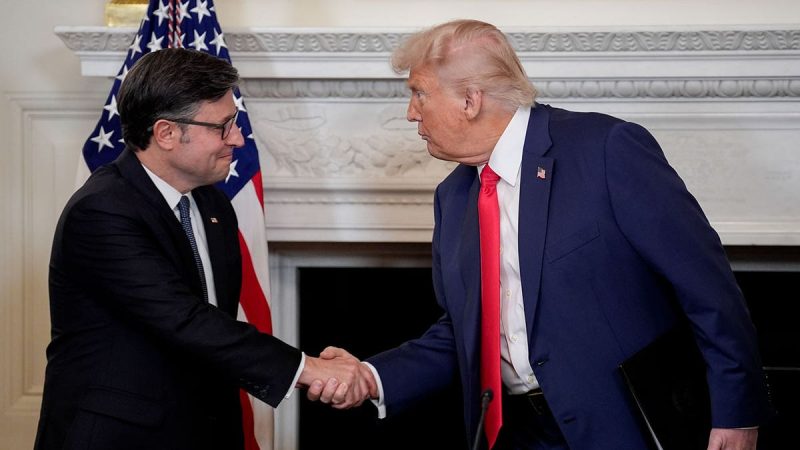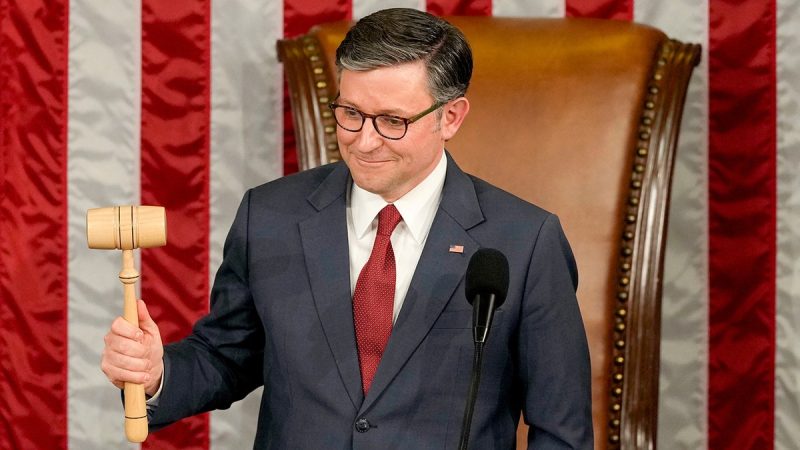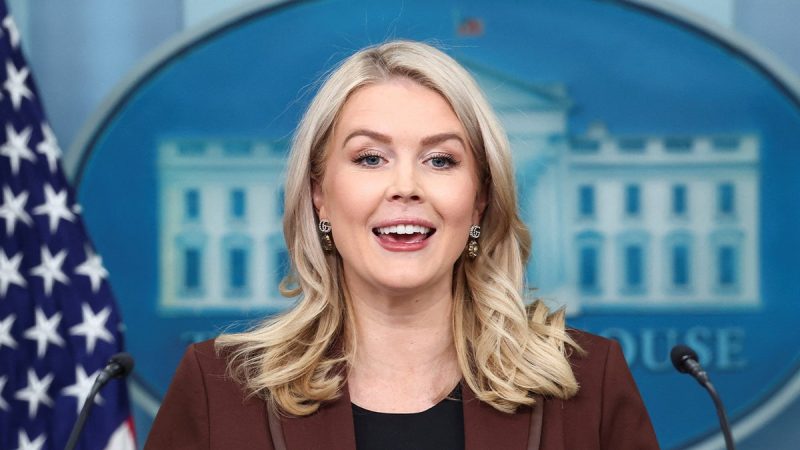Congress sends bill ending longest government shutdown in history to Trump’s desk

A bill to end the record-breaking U.S. government shutdown is headed to President Donald Trump’s desk after more than 42 days.
Federal funding legislation aimed at opening the government passed in the House Wednesday evening, ending the weeks-long fiscal standoff that has largely paralyzed Congress since Oct. 1. Republicans on the House floor erupted in cheers when the bill prevailed while the majority of Democrats quietly exited the chamber.
The White House said Trump would sign the bill at 9:45 p.m. this evening.
Six Democrats voted with all but two Republicans to pass the bill with a 222 to 209 margin. The Democrats who voted in favor of the legislation are Reps. Tom Suozzi, D-N.Y., Henry Cuellar, D-Texas, Adam Gray, D-Calif., Marie Gluesenkamp Perez, D-Wash, and Don Davis, D-N.C.
When the House took its initial vote on federal funding legislation on Sept. 19, just one Democrat — Golden — voted with the GOP.
The vast majority of House Democrats opposed the bill, however, including their senior ranks.
House Minority Leader Hakeem Jeffries, D-N.Y., reiterated to reporters hours before the vote that Democrats were frustrated the bill did not do anything about COVID-19 pandemic-era healthcare subsidies under Obamacare, also known as the Affordable Care Act (ACA). Those enhanced tax credits expire this year.
‘House Democrats are here on the Capitol steps to reiterate our strong opposition to this spending bill because it fails to address the Republican healthcare crisis, and it fails to extend the Affordable Care Act tax credit,’ Jeffries said.
House Speaker Mike Johnson, R-La., sounded optimistic in comments to reporters Wednesday morning ahead of the vote, however.
‘I wanted to come out and say that we believe the long national nightmare will be over tonight,’ Johnson said. ‘It was completely and utterly foolish and pointless in the end.’
Some drama threatened to crack House GOP unity earlier in the day, however, as some Republicans in the lower chamber seethed over a last-minute provision added to the bill that allows senators whose communications were tapped during former Special Counsel Jack Smith’s probe to sue the federal government for $500,000 each.
Reps. Chip Roy, R-Texas, Austin Scott, R-Ga., and Morgan Griffith, W.Va., all shared concerns with the measure but said they would not extend the government shutdown over it.
Johnson appeared to placate their and others’ concerns, at least for now, with a promise to vote next week on separate legislation repealing that provision.
Rep. Greg Steube, R-Fla., told reporters he would vote against the bill over its inclusion, however.
‘I’m not voting to send Lindsey Graham half a million dollars,’ he told reporters.
He and Rep. Thomas Massie, R-Ky., voted against the final bill, but their opposition was not enough to sink legislation.
Meanwhile, the shutdown’s effects on the country have grown more severe by the day.
Many of the thousands of air traffic controllers and Transportation Security Administration (TSA) agents who had to work without pay were forced to take second jobs, causing nationwide flight delays and cancellations amid staffing shortages at the country’s busiest airports. Millions of Americans who rely on federal benefits were also left in limbo as funding for critical government programs ran close to drying out.
At the heart of the issue was Democratic leaders’ refusal to back any funding bill that did not also extend the enhanced Obamacare subsidies. Democrats argued it was their best hope of preventing healthcare price hikes for Americans across the U.S.
Republicans agreed to hold conversations on reforming what they saw as a broken healthcare system, but they refused to pair any partisan priority with federal funding.
In the end, a compromise led by the Senate — which saw eight Democrats in the upper chamber join colleagues to pass the bill in a 60 to 40 vote — included a side deal guaranteeing the left a vote on extending the enhanced subsidies sometime in December.
Johnson has made no such promise in the House, however.
And the lack of a guarantee on extending those subsidies has angered progressives and Democratic leaders.
‘What were Republicans willing to give in the end, other more than a handshake deal to take a future vote on extending the healthcare subsidies?’ Rep. Shomari Figures, D-Ala., said Wednesday. ‘We all know that a future vote is the equivalent of asking two wolves and a chicken to vote on what’s for dinner. It is dead on arrival.’
Republican Study Committee Chairman August Pfluger, R-Texas, criticized Democrats for prolonging the shutdown for little payoff.
‘They literally got absolutely nothing except for a total and complete surrender, that accomplished nothing more than hurting American families,’ he said.
The bill kicks the current federal funding fight to Jan. 30, by which point House GOP leaders said they were confident they’ll finish work on a longer-term deal for fiscal year 2026.
It also includes full-year federal spending for the Department of Agriculture, the legislative branch, and the Department of Veterans Affairs — three of 12 annual appropriations bills that Congress is tasked with passing annually.
‘There are nine remaining bills, and we’d like to get all of those done in the next few weeks. And, so, [House Appropriations Committee Chairman Tom Cole, R-Okla.] and his appropriators will be working overtime,’ House Majority Leader Steve Scalise, R-La., told Fox News Digital.
Asked if he thought they’d get it done by that date, Cole said, ‘I think we can.’



